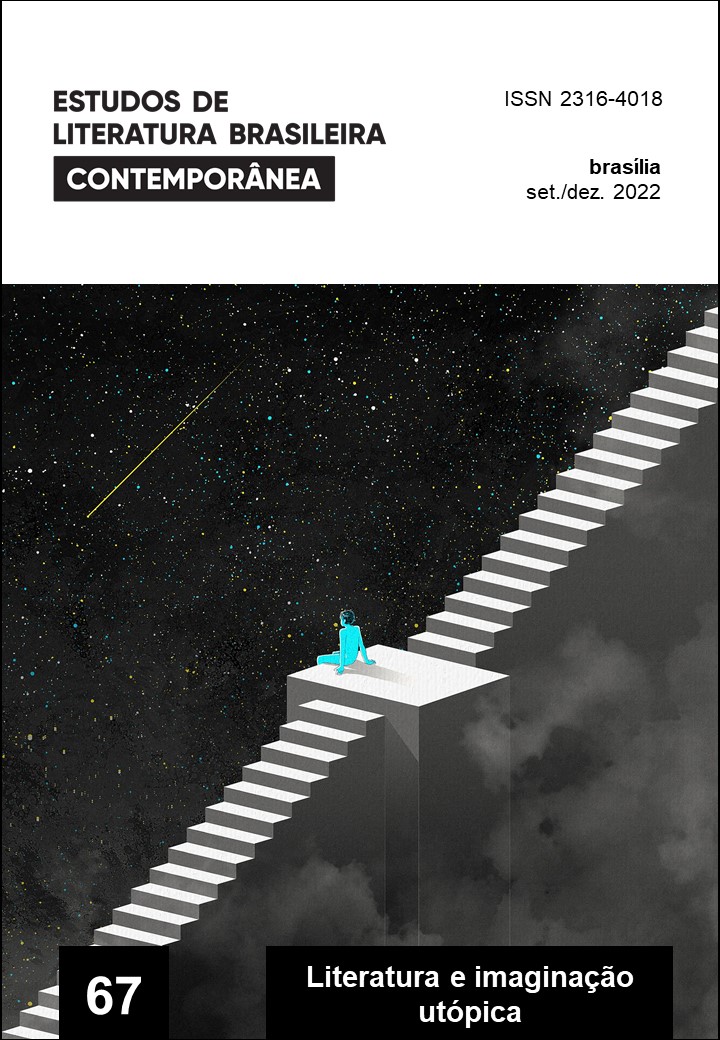Dystopia, symbiosis, and female agency in Bugônia (2021) by Daniel Galera
Keywords:
Daniel Galera; Brazilian novel; fiction; dystopia; symbiosis; female agencyAbstract
The article proposes a reading of the novel Bugônia (2021) by Daniel Galera, which, through a dystopia, stages the incidents of a group of individuals who have survived a global catastrophe and, before the arrival of a strange being to their community, they must define the course suits them as a society. On this basis, two objectives are developed: the first, to analyze the peculiarities of this dystopia; the second, to establish the role that women play as a link between humanity and nature. To carry out the reading, the contributions of Rosi Braidotti, Donna Haraway, Jacques Derrida, Slavoj Žižek, among others, are used.
Downloads
References
ALDERMAN, Naomi (2017). The power. Nueva York: Little, Brown and Company.
BRAIDOTTI, Rosi (2015). Lo posthumano. Barcelona: Gedisa.
BRAIDOTTI, Rosi (2020). El conocimiento humano. Barcelona: Gedisa.
BURGART GOUTAL, Jeanne (2017). Un nouveau printemps pour l’ecofeminisme? Multitudes, n. 67, p. 17-28.
DALCHER, Christina (2018). Vox. Nueva York: Berkley.
DERRIDA, Jacques (2006). Is there a philosophical languaje? In: THOMASSEN, L. (org.). The Derrida-Habermas Reader. Edimburgo: Edinburgh University Press.
DERRIDA, Jacques (2010). Seminario La bestia y el soberano. Buenos Aires: Manantial. v. 1.
DESPRET, Vinciane (2022). Habitar como un pájaro: modos de hacer y de pensar los territorios. Buenos Aires: Cactus.
DOLEŽEL, Lubomír (1997). Historia breve de la poética. Madrid: Síntesis.
DOLEŽEL, Lubomír (1999). Heterocósmica: ficción y mundos posibles. Madrid: Arco/Libros.
ERDRICH, Louise (2018). Future home of the living god. Nueva York: Harper.
FISHER, Mark (2021). Realismo capitalista: ¿no hay alternativa? Buenos Aires: Caja negra.
GALERA, Daniel (2021). O Deus as avencas. São Paulo: Companhia da Letras.
HARAWAY, Donna (2019a). Manifiesto para cyborgs: ciencia, tecnología y feminismo socialista a finales del siglo XX. Mar del Plata: Letra Sudaca.
HARAWAY, Donna (2019b). Seguir con el problema: generar parentesco en el Chuthuluceno. Bilbao: Consonni.
HILJE, Luka (1984). Simbiosis: consideraciones terminológicas y evolutivas. Uniciencia, v. 1, n. 1, p. 57-60.
HONORES, Elton (2018). Fantasmas del futuro: teoría e historia de la ciencia ficción (1821-1980). Lima: Polisemia.
JAMESON, Fredric (2000). Semillas del tiempo. Madrid: Trotta.
KING, Magiee Shen (2017). An excess male. Nueva York: Harper.
KRISTEVA, Julia (1981). Semiótica 1. Madrid: Editorial Fundamentos.
LÓPEZ DEL RINCÓN, Daniel (2019). Oráculo biotecnológico. Los modos futuros del bioarte. In: PIÑOL, Martha (ed.). Imaginar mundos: tiempo y memoria en la ciencia ficción. Vitoria-Gasteiz: Sans Soleil. p. 179-199.
MARTÍNEZ FERNÁNDEZ, José Enrique (2001). La intertextualidad literaria: base teórica y práctica textual. Madrid: Cátedra.
MARTORELL, Francisco (2015). Transformaciones de la utopía y la distopía en la postmodernidad. Tesis (Doctorado) - Facultat de Filosofía i Ciències de l’ Educació, Departament de Filosofia, Àrea d’ Estètica i Teoria de les Arts, Valencia.
MCCAUSLAND, Elisa (2019). Mujeres condenadas a su tiempo: la distopía como horizonte feminista en el siglo XX. In: PIÑOL, Martha (ed.). Imaginar mundos: tiempo y memoria en la ciencia ficción. Vitoria-Gasteiz: Sans Soleil. p. 203-217.
MCCAUSLAND, Elisa; SALGADO, Daniel (2019). Supernovas: una historia feminista de la ciencia ficción audiovisual. Madrid: Errata Naturae.
MELAMED, Jennie (2017). Gather the daugthers. Estados Unidos: Little, Brown and Company.
MORANTE, Raimundo de Miguel y Marques de (1867). Nuevo diccionario latino-español etimológico. Leipzig: Imprenta de F.A. Brockhaus.
OATES, Carol (2018). Hazards of time travel. Nueva York: Harper.
ORTNER, Sherry (1979). ¿Es la mujer con respecto al hombre lo que la naturaleza con respecto a la cultura? In: HARRIS, Olivia; YOUNG, Kate (eds.). Antropología y feminismo. Barcelona: Anagrama. p. 109-131.
PULEO, Alicia H. (2021). Ecofeminismo: para otro mundo posible. Madrid: Cátedra.
RECALCATI, Massimo (2018). Las manos de la madre: deseo, fantasmas y herencia de lo materno. Barcelona: Anagrama.
ROSE, Nikolas (2012). Políticas de la vida: biomedicina, poder y subjetividad en el siglo XXI. La Plata: UNIPE Editorial Universitaria.
SEDGWICK, Helen (2017). The growing season. Londres: Harvill Secker.
SHAH, Binah (2018). Before she sleeps. Encino: Delphinium Books.
SHIVA, Vandana (2015). El saber propio de las mujeres y la conservación de la biodiversidad. In: MIES, María; SHOVA, Vandana (Eds.). Ecofeminismo. Barcelona: Icaria. p. 261-274.
VIRGILIO (2004). Las bucólicas y Las geórgicas. Lima: Fondo Editorial UCSS.
YUKNAVITCH, Lidia (2017). The book of Joan: a novel. Nueva York: Harper.
ZILIO, Marion (2022). El libro de las larvas: cómo nos convertimos en nuestras presas. Buenos Aires: Cactus.
ŽIŽEK, Slavoj (1992). El sublime objeto de la ideología. México: Siglo Veintiuno.
ŽIŽEK, Slavoj (2000). Mirando el sesgo: una introducción a Jacques Lacan a través de la cultura popular. Buenos Aires: Paidós.
ZUMAS, Leni (2018). Red clocks. Nueva York: Little, Brown and Company.
Downloads
Published
How to Cite
Issue
Section
License

This work is licensed under a Creative Commons Attribution-NoDerivatives 4.0 International License.
Authors who publish in this journal agree to the following terms:
a) The authors maintain the copyright and grant the journal the right of first publication, the work being simultaneously licensed under the Creative Commons Attribution License-Non Commercial 4.0 which allows the sharing of the work with acknowledgment of the authorship of the work and publication this journal.
b) Authors are authorized to enter into additional contracts separately, for non-exclusive distribution of the version of the work published in this journal (eg publish in institutional repository or as a book chapter), with authorship recognition and publication in this journal.
c) Authors are allowed and encouraged to publish and distribute their work online (eg in institutional repositories or on their personal page) after the editorial process, as this can generate productive changes, as well as increase the impact and citation of published work (See The Effect of Free Access).
d) The authors of the approved works authorize the magazine to, after publication, transfer its content for reproduction in content crawlers, virtual libraries and the like.
e) The authors assume that the texts submitted to the publication are of their original creation, being fully responsible for their content in the event of possible opposition by third parties.


